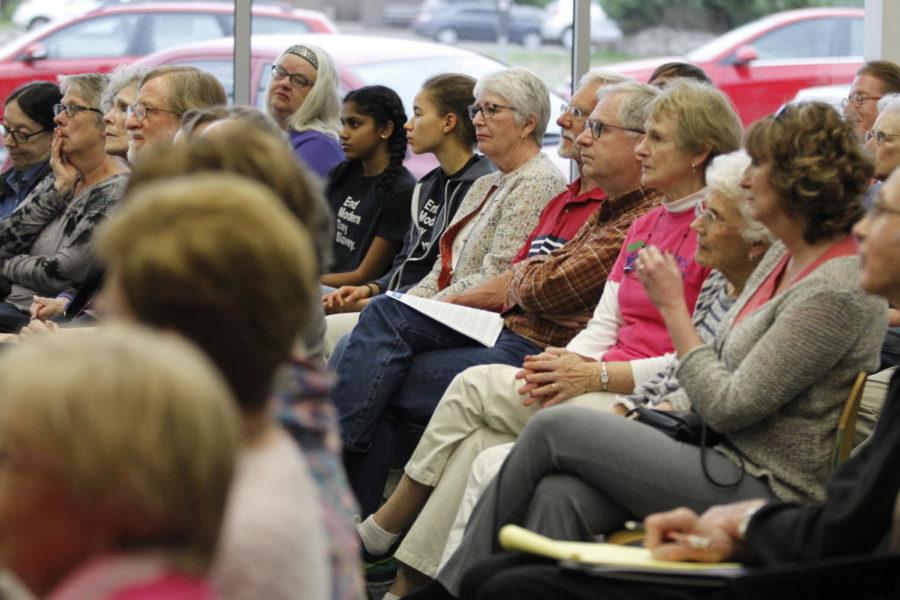AIRA, town hall panelists take action toward serving refugees
Chris Anderson/Iowa State Daily
Members of the Ames community attend the Ames Interfaith Refugee event at the Ames public library.
April 25, 2017
The Ames Public Library Auditorium hosted a community discussion by the Ames Interfaith Refugee Alliance (AIRA) on Tuesday that focused on Ames potentially becoming a resettlement city for refugees.
Before the town hall meeting began at 5:30 p.m., attendees could sign up to stay up to date with what AIRA is doing and get involved with helping the cause.
There was also a table to write letters and postcards to state legislatures to advocate for the support of funding for refugees and allowing immigrants to be welcomed to the country.
The members of the Social Justice/Outreach team of Ames United Church of Christ have made it a priority to help resettle refugees and hope to find others with similar ideals in the Ames community to help.
About a hundred people filled the auditorium, and the meeting began with a short film called “Yassin’s Falafel House,” a story about a Syrian refugee and his struggle to establish a falafel restaurant business in America. He dreamed of building a better future for his family in America and overcoming the fear he felt about being wrongfully judged for being Muslim in America.
This opened up the main topic of the evening: the process of resettling refugees. Each of the six panelists at the meeting gave an individual summary of what he or she is involved in and how it contributes to moving society toward welcoming refugees.
Ames City Council member Tim Gartin started by thanking the members of AIRA for pursuing the resettlement of refugees.
“This event has been a mobilizing force for a wide range of churches in Ames,” Gartin said.
He motivated the attendees to continue efforts to plan and strategize in order to help and welcome such vulnerable people. Gartin also hoped the meeting would encourage those with doubts about opening the city and community to those people.
He wants people to continue asking what they can do to serve refugees.
Another panelist who expressed how impressed she was by the alliance’s commitment to the cause was Carly Ross, a member of the U.S. Committee for Refugees and Immigrants. She brought attention to the global crisis that is the reality for millions of refugees and displaced persons in the world who are unable to return home.
Ross believes a surplus of refugees has been anticipated, and there is a dire need for communities to welcome them. Within the past month, Cedar Rapids has demonstrated this by having its first family settle there.
“The resettlement program is a family reunification program,” Ross said.
Its mission is to settle a refugee family where it is likely they will be able to reunite with their family. She said the process has been moving slower than originally predicted, and the future is a little unsure, but plans are still progressing.
Francis Chan spoke next. He began by apologizing for his heavy accent and “poor English.” Chan is a case manager for the Bureau of Refugee Services. He was born in Sudan and directly connects to the struggles of the refugees seeking a safe community and job opportunity in America.
He emphasized the basic human desires and needs the millions of displaced people in the world are hoping to gain and said it is up to good people to help them.
Beyond the challenge of preparing a community to welcome refugees is the extensive process of bringing a refugees to America.
Brynne Howard, managing attorney for Iowa Justice for Our Neighbors, explained that staff in the organization works with immigrants and refugees through the process they must go through to come here, and be resettled. It is a strenuous and grueling procedure, and only a small fraction of people actually get the chance.
The process does not get easier once arrival into the United States is complete and resettlement occurs. They then need to apply for legal residency. After five years, a test for citizenship, in English, is taken.
Iowa Rep. Beth Wessel-Kroeschell enlightened the audience about the concerns that have been brought to government attention regarding bringing in refugee families. She also mentioned a bill that has made its way to Gov. Terry Brastad’s desk that would ban schools from becoming sanctuary schools for refugees.
She voiced her distaste in such a bill and hopes proper voting takes place against it. She expressed this feeling and said, “It enriches our lives to bring in refugees.”
Yonas Michael, director of student services for the Ames Community School District, agreed with Wessel-Kroeschell. Michael told the attendees about how he has witnessed students who are refugees suffer with trauma from their experiences.
He thinks it is an unaddressed but very important issue and believes more should be done to make the refugees feel safe in a community. One way of doing this is establishing more helpful language learning resources in the schools.
Multiple members of the audience and Ames community took turns questioning the panelists and commenting with supportive statements about the hopeful, and important acts that need to be taken to welcome refugee families to the city of Ames and other areas of Iowa.
















